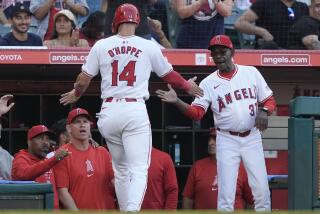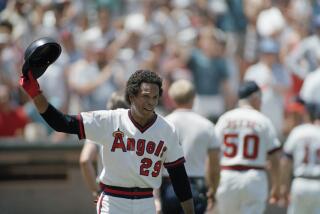BASEBALL ’95 : THE MANAGERS : Anonymous Angel : Marcel Lachemann’s Idea of Doing His Job Well Is to Have Fans Be Totally Unaware He’s Even Around
- Share via
A phone rang in the Angels’ spring training office. The room was empty except for Manager Marcel Lachemann, who was about to head home for the evening.
He had no obligation to answer, but instincts took over. He picked up the phone and tried to help the caller.
A few weeks later, storm clouds hovered over Phoenix, threatening the Angels’ exhibition game at Peoria, about 25 miles northwest of the city.
Lachemann needed a weather report, a chore usually reserved for a clubhouse attendant. But what did he do? He called the Peoria Sports Complex and asked if the game was on, not even identifying himself as the Angels’ manager.
He was put on hold--he could be a fan, for all the person on the other end knew--and waited patiently for an answer.
These acts provide a glimpse into a man who may be the most unpretentious, unassuming manager in baseball.
In a profession filled with egomaniacs and control freaks exuding pomposity, Lachemann is down to earth and modest.
“Yeah, I’m the manager of the club, but take that away and I’m no better than you,” said Lachemann, a former Angel pitching coach who starts his first full season as the team’s manager Wednesday.
“If there’s trash lying around the clubhouse, I’ll pick it up and throw it away. That just goes with my upbringing. You’re not too good to do anything.”
One characteristic that Angel pitcher Chuck Finley liked most about Lachemann, when he was the pitching coach, was whether you were 12-0 or 0-5, a rookie or a 10-year veteran, Lachemann applied the same amount of time and effort.
“One thing I ask for in my players is respect, not that they respect only me but each other and other people,” said the 53-year-old Lachemann, whose brother, Rene, is the Florida Marlins’ manager. “And not just reporters but clubhouse kids, the fans, guys handling baggage at the airport, everyone.
“It’s a common courtesy. You do that all the time, and our industry is not going to get a bad name, which we have to a degree because a lot of times we haven’t shown that kind of respect. It just goes with the territory.”
Lachemann is blue-collar to the core, from his upbringing as the son of a Los Angeles chef, to his years as an overachieving pitcher on the college and pro levels, to his managerial style and personality.
You’ll never hear him bemoan the long hours required of coaches, because they’re nothing compared to the hours his father, Bill Sr., put in as chef at the Biltmore Hotel for 30 years.
Bill worked 16 to 18 hours a day, usually seven days a week, and the family often went years without a vacation. Marcel, Rene and Bill Jr., now the Angels’ bullpen coach, spent summers working in the Biltmore kitchen from the time they were 12.
“We’d start at 6 a.m., and our dad would take us home at 2 p.m.,” Lachemann said. “We’d be all worn out, and he’d be going back for a second time around. He taught us at a young age that if you wanted anything, you had to work hard for it.”
Lachemann was the City Section player of the year as a senior at Dorsey High in 1959 but didn’t earn a spot in USC’s starting rotation until 1962, when he hurt his arm and resorted to throwing sidearm to avoid the pain.
Saying he “survived more than anything else,” Lachemann played seven minor league seasons before reaching the Oakland Athletics in 1969. He spent a little more than two seasons with the A’s, compiling a 7-4 record and a 3.44 earned-run average before his release in 1972.
Lachemann began coaching in the Montreal organization in 1973, served as an assistant at USC in 1977-81 and was hired as the Angels’ minor league pitching instructor in 1982.
John McNamara, Angel manager in 1983-84, brought Lachemann to the big leagues in ‘84, and it is a testament to Lachemann’s ability as a pitching coach that he worked under five Angel managers in nine years.
“He could spot a flaw like that,” Finley said, snapping his fingers. “He worked (hard) studying tapes of each guy, and he’d have it all stored so he could correct things before they got too bad.”
Marcel left Anaheim after the 1992 season to become Rene Lachemann’s pitching coach in Florida, an experience Marcel described as “the best 1 1/2 years we ever had together.” Then came the call from Angel General Manager Bill Bavasi last May.
Bavasi wanted to fire Buck Rodgers, but only if Marcel would agree to become the Angels’ manager. Lachemann was in a comfort zone--he enjoyed working for Rene, and he knew his conservative personality was more suited to the behind-the-scenes nature of coaching.
But after discussing the offer with Rene and Marlin coach Doug Rader, who managed the Angels in 1989-91, Lachemann decided to take a chance, figuring that such an opportunity might not arise again.
Three months later, Lachemann was wondering what he had gotten himself into. The Angels fell to 30-44 by the time the strike ended the season in August, and Lachemann, for the first time feeling the burden of the whole team and not just a pitching staff, had trouble coping with the losses.
He would stay up until 2 a.m. replaying every pitch. He’d second-guess his decisions. He became even more introverted around the house, barely saying a word to his wife, Sue, after some losses.
“It’s difficult for me because I lose perspective sometimes,” he said. “I’m trying to get better at that because I’m aware that sometimes my mood is predicated on whether we win or lose. But to tell you the truth, there’s not an awful lot of good about losing.”
To avoid those feelings that come with losing, he has placed an even bigger emphasis this spring on fundamentals, such as baserunning, bunting, hitting behind runners, cutoff and relay plays, not walking leadoff batters.
“There’s been a degree of grumbling, guys wondering why we’re doing these things, but the reason is because we haven’t done them well,” Lachemann said. “We’ve been a second division team and we haven’t won. To win, you need to do all those things right all the time. I want to create an atmosphere where nothing is taken for granted.”
He has also vowed not to make the same kinds of mistakes he made last season, such as the time he wanted Bo Jackson to pinch-hit late in a game and the batter ahead of Jackson doubled. Lachemann still sent Jackson up, and the slugger was intentionally walked.
“I lost my best pinch-hitter because I didn’t react to a situation that changed on me real quick,” Lachemann said. “It was a learning mistake, but those are things I can’t let happen.”
He jumped into a difficult situation last season, and the combination of replacing a very popular manager, enduring mounting losses and dealing with media scrutiny made him a tough interview at times.
But Lachemann seems to have grown more comfortable with reporters this spring.
He may not entertain you with jokes, like Dodger Manager Tom Lasorda; regale you with stories, like Detroit’s Sparky Anderson, or dazzle you with one-liners like Rodgers, but he has a dry wit.
For example, when Angel pitcher Joe Magrane ran into trouble against the Seattle Mariners in a morning B game last week, Lachemann said: “He didn’t miss many bats.”
“The young guys on the team think he’s so serious, but he loves to joke around,” Finley said. “I’ve been with him so long, I know just how to get under his skin, tweak him.”
A favorite pastime for Finley--and former Angel pitchers Jim Abbott and Kirk McCaskill--would be to impersonate Lachemann going to the mound to take out a pitcher.
“If he sinks his hips into you, you’re in trouble,” Finley said. “And if he grabs you by the hips like he’s doing a slow dance with you, that’s it, you’re done.”
Several Angels have poked fun at another Lachemann quirk: Sticking a fungo bat in the back of his uniform pants during practice. He laughs along with them.
“If I leave it laying around, I end up looking for it half the time,” he said. “So this way I know where it is.”
Lachemann said he doesn’t like to think of himself as “a grouch-type person who doesn’t have a sense of humor,” but in fact, he’d prefer to remain anonymous.
“It’s like with a real good umpire: When the game’s over, you don’t even know who he was because he did his job so well you weren’t aware of what he was doing,” Lachemann said.
“I’d like to be able to manage that way, so when the game’s over, someone hit a home run or pitched a shutout, and managing doesn’t become the focus; where everything runs so smooth that all you see is the players playing. That would mean I’ve done a good job managing.”
More to Read
Go beyond the scoreboard
Get the latest on L.A.'s teams in the daily Sports Report newsletter.
You may occasionally receive promotional content from the Los Angeles Times.







